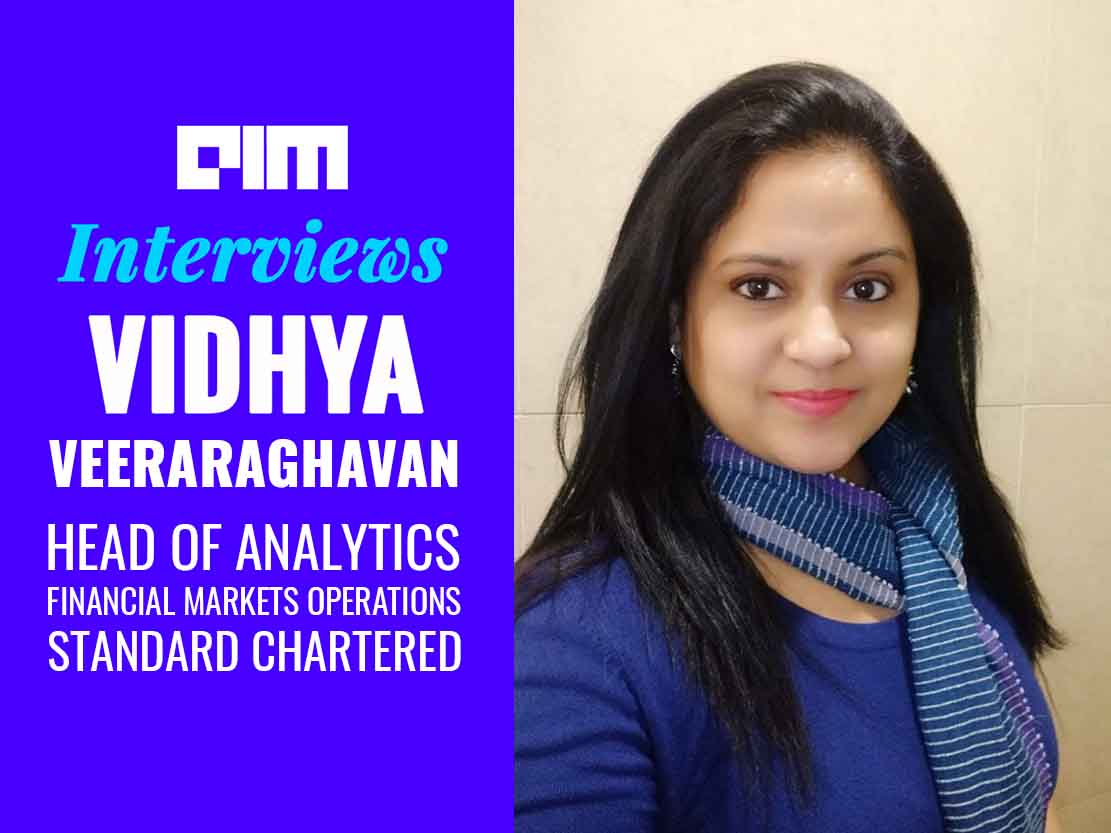“Even after two decades of corporate experience, I still crave for learning new tools, methods, business and literally anything that excites me.”
Vidhya Veeraraghavan
For this week’s data science column, Analytics India Magazine got in touch with Vidhya Veeraraghavan, Head of Analytics at Standard Chartered Global Business Services. Vidhya has been in the analytics industry for almost two decades, and in this interview, she shares the most valuable insights from her analytics journey.
AIM: Can you talk about your career in finance and your introduction to the world of Data Science?
Vidhya: Through and through, I have been a commerce student. Right from grade 11 till I got my Masters degree in Commerce. Even for my MBA, I had chosen Banking as my specialisation. Another moving force behind me was Florence Nightingale, a renowned statistician and arguably the mother of healthcare analytics. She is a great inspiration, and her story has powerful lessons for passionate analytics professionals like me.
The irony about my data science career is, I used to hate computers in school and today, I’m Head Of Analytics for a multinational financial services company. My love for data science started with SQL, which paved the way for SAS, R & Python. That said, my first love was, is, and always will be Microsoft Excel.
My first data science job interview was simple. The position required someone with SAS certification, SQL experience, with Banking background and people with leader qualifications. I fitted the bill perfectly because I made a point to fill in the gaps that I found.
“Nothing can match the thrill of your model yielding results with great accuracy.”
AIM: For a professional, how difficult is it to prepare for an ever-changing data science domain and to succeed?
Vidhya: Having an only formal education is not enough to land in a good job or sustain in the cut-throat environment. Experience matters. One needs hands-on experience to be good at anything. And, experience doesn’t always mean corporate experience.
For instance, I have backed up my academics with certifications in SQL, SAS, R, Python, Machine Learning, Deep Learning, Tableau and Power BI. I’m also a Certified Scrum Product Owner (CSPO). The latest certification I added was Executive Data Science from John Hopkins University. Currently, I’m working on my RPA Program Manager certification.
During the course of my career, I have learnt that not everyone can understand data like a coder does. So, I turned my attention towards visualisation tools, which introduced me to Tableau, which also happens to be my favourite tool although I like the easiness of using Power BI (an extended arm of Microsoft Excel) and the vibrancy of SAS Visual Analytics.
Any project that you can work on, be it Kaggle competitions or an internship that deals with cleaning data for an extensive period of time, all this counts as good experience. It is important to be a continuous learner. I have almost two decades of corporate experience, but I still crave for learning new tools, methods, business, literally anything that excites me. I am learning German language, RPA and the art of being an influential leader.
AIM: How has the landscape of fraud analytics changed over the years?
Vidhya: Fraud Analytics is one area in financial institutions where we have witnessed a constant change. You are always expected to be up in the game. Earlier, the primary tool sets for banks were Microsoft Excel and Microsoft Access, which were used for data churning and pattern recognition. Whereas, SAS, due to its highly secured nature, was preferred by most of the banks. Top vendors have gradually started to include Fraud detection modules to their gamut of offerings. Today, there are many open-source offerings in the market, which are quite user-friendly. My personal favourites are the AI-based modules that can detect fraud using machine learning to recognise patterns with data mining techniques. The advent of machine learning has provided an opportunity for the banks to be more proactive in the situations.
AIM: What are the key data points that you look for or have consistently observed with regards to financial data?
Vidhya: Vast amounts of structured data is available for mining within every bank’s network. These are both transaction data and static data. Pattern recognition, tracking location-wise transactions for early detection of skimming fraud and setting robust parameters for detecting application frauds are key features. For example, in this pandemic situation, markets are quite volatile and at high risk. Hence financial crime risk metrics are now being closely watched with heightened securities within the Banking industry.
“If you take your people along with you on your journey of data science, you can reach greater heights with minimal efforts.”
AIM: Few words about the challenges you have faced in leadership roles.
Vidhya: In any organisation, people can be both valuable and challenging. My strategy is to convert this biggest challenge to your treasured asset through inclusion. If you take your people along with you on your journey of data science, you can reach greater heights with minimal efforts. My worst experience would be when I am the only one in the room who understands the need for data analytics and data science, and the rest are resisting the inevitable. To build and drive a data culture around you is the toughest challenge that I have faced so far.
AIM: Any projects that you are proud of?
Vidhya: Few projects that I have spearheaded include delivery of analytical models forging alliances between business teams, developers and analysts in an AGILE manner to churn out meaningful insights. I have also leveraged Big Data technologies & Business Intelligence tools to identify the financial risk exposure and have applied data as a solution to highlight the client digitisation opportunities, which has resulted in significant increase in digital footprints!
AIM: Any tips for the Data Science aspirants?
Vidhya: Analytics is a broader area, so while hiring analytics professionals, I look for those who bring multiple skills on board, which include Business Analysis, Business Intelligence, coding, statistics, most importantly passion and learnability.
That said, networking plays a key role too. Unironically, I met my first contact in data science in a networking event. LinkedIn helped me with my first break, and it has been a good companion ever since. Another small trick that I often tell my prodigies compare your current position with the position that you aim for. You can easily identify the gaps, and once you do, it is easy to fill the gaps, both education-wise and experience-wise.
I am a firm believer of “continuous learning”, and this is much easier nowadays. All you need is a smartphone. Google answers almost every question that we have, including writing code or learning a new shortcut or formula in excel. Beginners can also make good use of Youtube, which has a plethora of lectures from experts in the field.
Personally, I have gained a lot of knowledge through MOOCs like Coursera, Udemy and others. Books for Dummies and Harvard Business Reviews along with certifications from Great Learning institute helped me as well. I also closely follow Analytics India Magazine, AnalyticsVidhya.com, Business Insider (Tech), BernardMarr.com, forbes.com (analytics), KDnuggets.com to keep in close touch with the industry news. I am also active in LinkedIn, which helps me keep my networking alive.
It is important to remember, Data Science is an intellectual and practical activity that includes a systematic study of the structure and behaviour of data. But it is also an art form that requires some creativity and imagination to communicate the data story. Data Science is not “all work and no play”. So, remember to have fun while learning and experiencing the exciting world of Data Science.






















